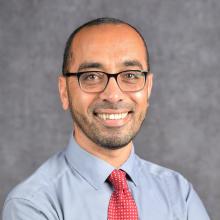Kris Marcus brings 20 years of health-system based practice in the academic medical center setting to her teaching. After completing a general pharmacy practice residency at Oregon Health & Science University (OHSU), she joined the pharmacy administrative team and physician and nursing stakeholders to create business plans and start up the first operating room pharmacy satellite in the state and an ophthalmic specialty outpatient pharmacy. Once those new practices were up and running, she moved back to inpatient team-based care roles including cardiology, critical care, internal medicine, general surgery, pediatrics, oncology/BMT, and solid organ transplantation. After working in direct patient care, she transitioned to her “dream job” focused in drug information, formulary management, drug policy/MUE and institutional guideline development, provider education, and staff development. During her time at OHSU she was also involved in classroom and experiential teaching for the OSU College of Pharmacy and OHSU’s residency programs. She served for 8 years as the PGY1 Pharmacy Residency Program Director and also helped establish and precept in the PGY2 Drug Information Residency. She was part of the team that designed the first accredited PGY2 Pharmacy Informatics Residency in the nation.
She is one of the founding faculty of the Pacific University School of Pharmacy and enjoys collaborating with faculty, staff, and students to continually improve and innovate within the student focused curriculum. While she has taught in most coursework areas, her current classroom teaching is focused in social and administrative sciences (SAS), personal and professional development (PPD), pharmacy skills (PSA), and therapeutics (IST). Some of the major themes of her current teaching mirror her practice experience in drug information, drug policy, evidence-based practice, and pharmacy administration. She adopts an application mindset in her teaching and often includes real world examples and practical activities in her lesson plans to show students the connection between the clinical, professional, and administrative responsibilities of the pharmacist. Since the school opened in 2006, she has also been heavily involved in teaching pharmacy clinical skills and problem solving and designing and implementing the activities and assessment of those curricular outcomes. Recently she partnered with other faculty on curricular redesign and mapping for the SAS stream and the PPD stream, the latter of which she is a multi-course chair and stream chair. In addition to other school, college, and university service, she has an academic appointment as the School’s Coordinator for Pharmacy Residency Preparedness Program where she provides structured support to students and alumni exploring or navigating the process of obtaining a post-graduate training program position.
Her professional involvement has been oriented toward health-system practice, pharmacy technician practice advancement, and pharmacy residency training. Her national involvement in the American Society of Health-System Pharmacists (ASHP) and the American College of Clinical Pharmacy (ACCP) has included policy making, white paper publication, and practice change task forces. Since joining the academy, she has added involvement in teaching oriented professional organizations such as the American Association of Colleges of Pharmacy (AACP), the teaching Sections of ASHP and ACCP, and the AACP Faculty Sections connected to her curricular areas. She is active in the Oregon Society of Health-System Pharmacists (OSHP) as a past chair and member of the planning committee for the Northwestern States Residency Conference. She remains engaged in the future direction of the Oregon society as a member of the OSHP Past Presidents council. She received the lifetime fellowship professional achievement award, FOSHP, in 2015. She has made numerous presentations to her peers at regional (OSHP) and national meetings (ASHP and AACP) and has participated as a school representative at AACP’s Institutes.
Her primary research foci are connected through her evidence-based practice and teaching experiences. Her scholarship interest areas are: evidence synthesis, the scholarship of teaching and learning, and pharmacy administration training topics (post-graduate residency training, experiential education, and preceptor development). Current projects include: a survey of grading systems in US Schools of Pharmacy, a systematic review of trends and factors impacting pharmacy residency match rates, collaborative systematic reviews of clinical research questions, and development of critical appraisal of the medical literature and systematic review training modules for graduate students, residents, and preceptors.
For more information, please review Associate Professor Marcus’ CV



































